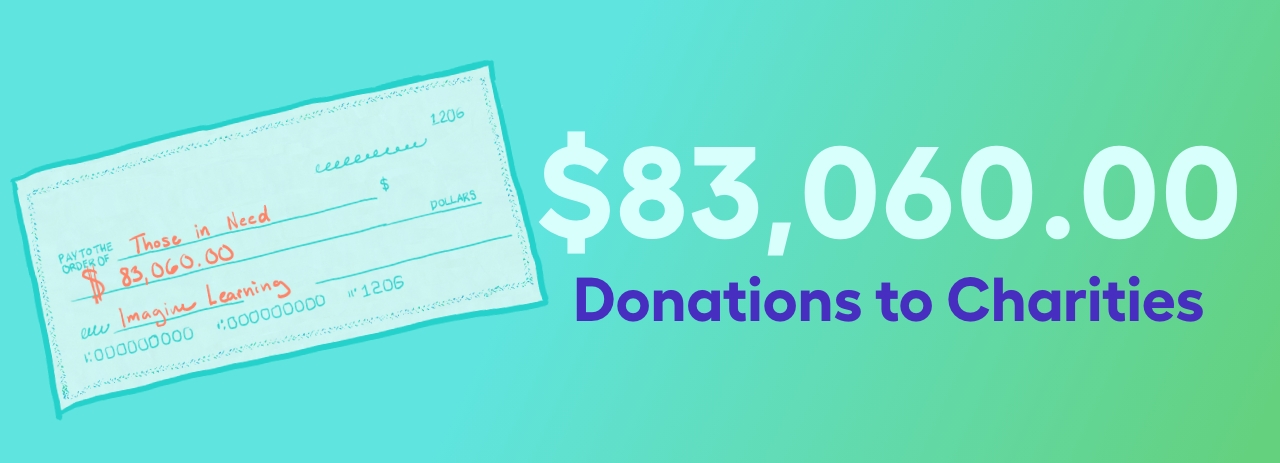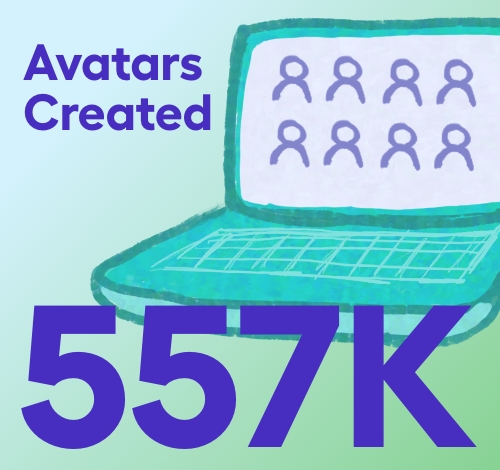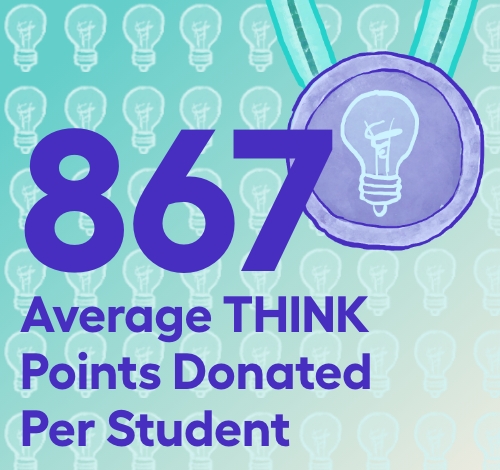
June 9, 2022 8:00 am
Imagine Math’s THINK points program allows students to earn rewards for themselves, their class, and charities by completing lessons.
What motivates you to work harder? I knew I was getting closer to middle age when I realized the harder I worked, the better I’d sleep — motivation level 10: unlocked. Sometimes motivation comes in the form of little bonuses (ahem, dessert), sometimes it’s a healthy sense of competition, and sometimes the prospect of a warm, fuzzy, ‘do-gooder’ feeling is what gets us to tackle a challenge.
It turns out that kids and adults aren’t that far apart in this respect; Imagine Math has demonstrated as much with its THINK points program. This innovative motivation system inspires students to learn by helping develop problem-solving skills, perseverance, and confidence. As students work through their Imagine Math lessons, they earn THINK points. THINK points are awarded for completing lessons, with additional points awarded for performing well. Students can use their points to design and accessorize their Imagine Math avatar, contribute to classroom goals (pizza party, anyone?), or donate money to students in need.

The points students earn by working through lessons are applied to their total number of points after they have completed the entire lesson, which helps keep them motivated to finish the full lesson before spending their points.
They can view their points on their home screen and the Class Leaders dashboard. Students can see the number of THINK points they’ve earned in the current lesson, the total of the points they’ve earned this year, and the number of points available to spend at the moment (grand total minus points already spent).


The points leaderboard shows a hierarchy of who has earned the most THINK points that week and who has completed the most lessons. It updates every 15 to 30 minutes and resets every Saturday evening, only displaying the number of points each student has earned for the current week. It’s designed to continually motivate students and give each student a fair chance to be at the top for that hour, day, or week.
As a reward and part of what makes Imagine Math so engaging, students get to choose how they’ll spend their hard-earned THINK points. Some like to build out their avatars, expressing themselves with different skins, features, and accessories. Others are motivated to contribute to the teacher-established classroom goal, and an inspiring number of students opt to transfer their points into monetary gifts to charity. The charity calendar changes month to month, exposing students to a variety of opportunities to make a difference in their world.
“I wanted to be the No. 1 on the leaderboard in the state of Texas, so I had to do a lot of lessons – and that’s how I racked up the points. It makes me very proud that I can be of some help to the people in need.”

Imagine Learning is proud to report that 2021–2022’s students donated to 29 beneficiary charities, choosing to transform their math achievements into an impressive $83,060 for worthy causes! (Cue Whitney Houston because we, too, believe ‘the children are the future.’) It’s an incredible testament to their characters and their efforts to advance their learning, and as a bonus, it gives teachers a morale boost.
Tracy Gonzalez, a 4th-grade math teacher at W.C. Andrews Elementary in the Gregory-Portland ISD, says, “it makes me so happy, and I’m so proud of my students when they enjoy donating their THINK points to charities! They are helping towards a great cause every time they do so!”
The American Red Cross Tornado Relief Fund was one of the partner charities this year. Vista Hills Elementary student Yash Anand was the top donor in the nation, earning a remarkable 1.6 million THINK points to contribute to the fund.
“I wanted to be the No. 1 on the leaderboard in the state of Texas, so I had to do a lot of lessons – and that’s how I racked up the points,” said Anand. “It makes me very proud that I can be of some help to the people in need.”
Students should be celebrated for working hard, whether they’re in it for the avatar, the parties, the competition, or the good karma. Their motivation can be as personal as the learning path they’re on, just as long as they also have a meaningful exploration of (and growth in!) mathematical understanding.
Kallie Markle lives in Northern California with her family of humans, house plants, and dogs. The humans take up the least amount of space. Before joining the education world, she wrote her way through national parks, concerts, tourism, and brewing.